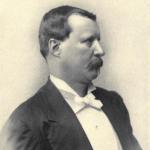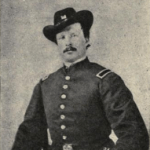
Captain James Baxter, of Boise, is a native of England, his birth having occurred in Norwich. His parents were Frank and Mary (Gunn) Baxter, who came with their family to the United States when the Captain was very young. They resided near New York City for some years, and then removed to Paterson, New Jersey. The father was a horticulturist by occupation and successfully engaged in the cultivation of vegetables and flowers. Soon after his arrival in America he took steps toward becoming naturalized and was recognized as a valued and influential citizen. He served as county commissioner in New Jersey for a number of years, and was also county sheriff, in which positions he discharged his duties with signal ability. After a residence of thirty years in America, he died at the age of seventy-eight. His widow still survives him, and at the age of eighty-seven years is living in Paterson, New Jersey, where she has so long made her home. She was the mother of thirteen children, seven of whom grew to years of maturity and are still living.
In the public schools of New York City James Baxter began his education, which he continued in Paterson. Subsequently he attended the school of mines at Columbia College, New York, and was graduated there as a mining engineer and metallurgist. He learned the machinist’s trade with the Rogers Locomotive Company, of Paterson, New Jersey. In 1856 he went to Chili and for three years was master mechanic for the Southern Railroad, of that country. In 1859 he returned to the United States and purchased a plantation in Mecklenburg County, North Carolina, called the Jugnot, because of its gold indications. After six months spent in developing this and finding no gold in paying quantities, he abandoned it and went to Colorado, locating a mine in Gilpin County, and was engaged in erecting mills and other machinery.

But now the trouble between the north and the south, occasioned by the slavery agitation, brought on the civil war, and, realizing the need of the Union for all its loyal sons, Mr. Baxter put aside all business interests, disposed of his property and returned to New York, where in August, 1 86 1, he enlisted in Company K, First New York Regiment of Engineers. During his service he was promoted successively to the ranks of corporal, sergeant, second lieutenant, first lieutenant and captain. He also served for some time on the staff of General Gilmore. He was injured several times, the last time at Fort Johnson. South Carolina, by a shell which broke his hip. He was mustered out near the Appomattox River, in May 1864, and went home, it was supposed to die, just owing to the aid of a strong constitution he eventually recovered from his injuries, although for two years he was obliged to go about on crutches. He suffered much, but finally recovered and then went to Colorado again, and to the South and Central Americas, where he was engaged in mining.
In 1883 Captain Baxter went to Mexico, where he was engaged on the construction of smelters and a railroad. He first visited Idaho in 1874, at which time he operated extensively in the Atlanta and Rocky Bar. In 1892 he came to Boise and established a foundry and machine shop known as the Boise Iron and Reduction Works, in which he manufactures quartz mills and all kinds of mining machinery. He has built as many as twenty mills, each one of which, when erected properly, has been a complete success and given the fullest satisfaction to the owners. Captain Baxter is meeting with a well-deserved prosperity in this undertaking, owing to his comprehensive understanding of the business, his thoroughness, reliability, and upright dealing.
In 1854 Captain Baxter was united in marriage to Miss Amanda Langworth, of Paterson, New Jersey, and they have had eight children, of whom four are living, namely: Julia, wife of C. V. Smith; Fannie, wife of James Williams; Charles F. and Carrie, the latter at home. Captain Baxter and his family are members of the Baptist church, and in Boise they live in a pleasant and commodious home, whose hospitality is enjoyed by their many friends. The Captain is a Royal Arch Mason. He was made a Master Mason in Nevada Lodge, No. 4, of Colorado, in 1866, and subsequently took the chapter degrees in Charlotte, North Carolina, in 1868. He was a charter member of Alturas Lodge, No. 12, of Idaho, was its worshipful master for four years, and is now a valued member of both the blue lodge and chapter of Boise. He has been a member of the Knights of Pythias fraternity since 187 1 and is post commander of Phil. Sheridan Post, No. 4, G. A. R. He is a progressive and public-spirited citizen who is as true today to duty as when he followed the stars and stripes through the great southern rebellion. He ever supports all measures for the educational, social, material and moral advancement of his city and state, and at all times has lived so as to command the esteem of his fellow men, which is accorded him in a large degree.
